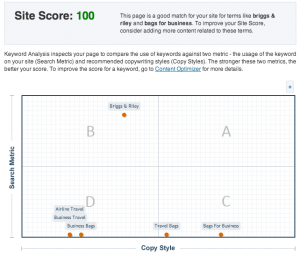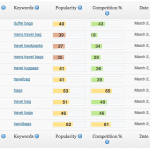About a month ago when I shared “Finding the fun by changing direction,” I didn’t anticipate that part of the fun would be learning the value of performing keyword research before writing a blog post. But half the fun of most journeys is not knowing where they will take you or what you will end up learning. So how did a guy who knew almost nothing about SEO and keywords three years ago turn into a pretty decent practitioner of both? The short answer is both SEO and keyword research are a necessity if your blog is going to be a profitable business. But I’m not talking about this blog, so let’s get into the story of how I found myself in this strange place.
Writing for fun and profit
Let me start with the realization that this blog was probably never intended to be a profit-making venture. It can’t be if it’s going to be a place you come to find Jim Raffel and the unique stories only I can tell. That’s not to say I won’t find ways to monetize what I do here in small ways. It’s just that it’s not an overarching goal of the writing I do here.
Instead let’s talk about the 4 or 5 sites I’ve conceived of and/or launched to some degree or another over the last few years with the goal of being a profitable business. This journey has culminated with the soft launch of Business Travel Exclusive (BTE) on March 1. BTE is a different type of endeavor for Shelby Sapusek and me in that we go into this project with a great deal of subject matter expertise and blog/website creation knowledge. We’ll also be leveraging Shelby’s 17 years of journalism and graphic design experience in several ways.
The key points are that we know what we are doing and we know what we are getting into. This is not going to be a hobby (like this blog is). Instead it’s going to be a business, and it has been from day one. We’re following the three-step formula we developed for our She / He Media clients: Define your brand, grow your audience and execute your strategy. We have a plan; we are not winging this.
So it’s business writing. What now?
What really changes when your writing goes from a hobby, such as this blog, to a business like BTE? The short answer is that site traffic isn’t just a fun statistic to keep track of; it’s the life blood of the business. We’ll need lots of folks visiting BTE and liking what they read enough to sign up for our email newsletter. Today, we find ourselves in the middle of step two of the She / He Media formula and that means we need to grow our audience and we need to do it fairly quickly. We have six months versus the years it took many of the early hobby bloggers to grow an audience from zero to thousands of email subscribers.
This means we need to write tightly focused content about business travel topics. There are two good reasons for this. First, our intended audience is business travelers so the topics need to be those that appeal to that audience. Second, Google and other search engines now want your entire site to be focused around a single area of subject matter expertise. At least, this is what the experts tell us about the new search algorithms.
No need to reinvent the wheel
I’ve written before about SEO and keyword research and my story is going to remain consistent in that I still don’t want to learn all the details of these areas of expertise. I’m more than willing to pay someone else for their expertise, so on the BTE site we are utilizing two tools to help us with SEO and keyword research.
WordPress SEO by Yoast – the free way to go
 WordPress SEO by Yoast is a WordPress-powered site and as such it’s a good idea to install a plugin that allows you to customize the Focus Keyword, SEO Title and Meta Description of each blog post. Some themes include this capability but I recommend staying away from using that feature in any theme. The reason is that when and if you choose to change themes you will have to figure out a way to move this very important meta data to the new theme. By sticking to a dedicated SEO plugin, you remove that restraint and/or the time drain of any future site redesign.
WordPress SEO by Yoast is a WordPress-powered site and as such it’s a good idea to install a plugin that allows you to customize the Focus Keyword, SEO Title and Meta Description of each blog post. Some themes include this capability but I recommend staying away from using that feature in any theme. The reason is that when and if you choose to change themes you will have to figure out a way to move this very important meta data to the new theme. By sticking to a dedicated SEO plugin, you remove that restraint and/or the time drain of any future site redesign.
 The neat thing about WordPress SEO is that it also contains a free SEO analysis tool set. Once you’ve filled in all the necessary meta data, the plugin returns red, yellow and green light analysis of the post on both an overall basis and also with drill down detail of what could be improved. If you are on a limited budget and explore the many features of this plugin, you may find it to be good enough for your purposes.
The neat thing about WordPress SEO is that it also contains a free SEO analysis tool set. Once you’ve filled in all the necessary meta data, the plugin returns red, yellow and green light analysis of the post on both an overall basis and also with drill down detail of what could be improved. If you are on a limited budget and explore the many features of this plugin, you may find it to be good enough for your purposes.
 Scribe Content – taking it to the next level
Scribe Content – taking it to the next level
There are free ways to do keyword research but no good ones I have found that reside right within the WordPress writing interface as a widget connected to a powerful API. This means that as I begin to write a blog post about business travel restaurant reviews I can quickly research combinations of those keywords for several metrics.
Before we get into those details let’s remember that BTE is a professional venture for us, so spending some money to improve our odds of success is something we are willing to do. We also happen to make use of Scribe Content as an agency level tool within She / He Media so there was no additional out of pocket expense for us.
 As we perform our keyword research for each article, we are able to see what type of competition we are up against for these keywords and what the overall popularity of the keywords is. The trick is to find a balance between high popularity and the lowest possible competition. Does any of this change the articles we intend to write? The short answer is yes; but not when it comes to the substance of content. The changes we make are in our choice of words to describe what we are writing about.
As we perform our keyword research for each article, we are able to see what type of competition we are up against for these keywords and what the overall popularity of the keywords is. The trick is to find a balance between high popularity and the lowest possible competition. Does any of this change the articles we intend to write? The short answer is yes; but not when it comes to the substance of content. The changes we make are in our choice of words to describe what we are writing about.
 If part of our strategy for monetizing BTE turns out to be Google Ads, then we want to make sure our site is rich in keywords to reach business travelers. In that way, our site will end up with ads relevant to our audience and hopefully income producing for us.
If part of our strategy for monetizing BTE turns out to be Google Ads, then we want to make sure our site is rich in keywords to reach business travelers. In that way, our site will end up with ads relevant to our audience and hopefully income producing for us.
How about you? Are there writing projects you work on that SEO and keyword research are important enough to do before you start writing?
